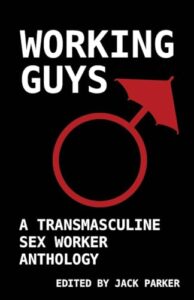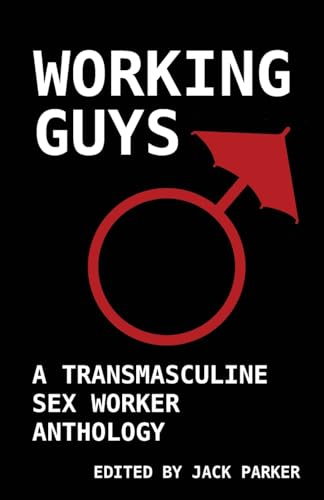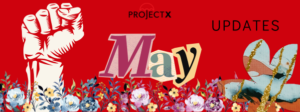
Working Guys is a collection of stories by transmasculine sex workers that take readers through different moments in their lives.
The stories intersect between a few central themes, such as perceptions, media representation, and violence inflicted on trans sex workers. These nudge us to look at support systems and systematic changes required to address vulnerability, outlining the grey area between empowerment and vulnerabilities transmasculine sex workers face.
How far can one conform to expected ideas of gender before it becomes harmful?
“He told me that he struggled to see me as a man because I sell sex … and I found it hard to see the version of myself that I hid behind for work as anything other than a woman too. What he said to me had spread the sickness and I felt unsure in my identity.
I pretended to be a woman for work, so people saw me as one outside of it too”
Only women sell sex by Liam
In the anthology, several contributors recount the bittersweet irony of adopting female persons to cater to the demands of the market. This performance, often described as “cis for pay”, often binds trans sex workers to conform to different gendered expectations. When transmascs fail to meet the binary societal expectations of how a ‘man’ should look or behave, they are faced with violence of all types and degrees.
Sex workers capitalising aspects of oneself that can be eroticised is a form of powerful personal reclamation. On the flip side however, it leans into or even perpetuates harmful stereotypes that eroticise certain traits, further resulting in discrimination and violence.
Why are sex workers’ choices about their own bodies often subjected to the opinions of others?
“If you’re selling your body, isn’t it prudent to keep everything intact? Surely you’d lose customers if you had this surgery.”
An Appointment at Charing Cross by Mx Dagger
In stories shared, several contributors to the anthology mention experiences where they were “hammered on details, including the type of sex work that were done” during requests for medical references for gender affirming surgery. These experiences highlight a higher barrier for trans people when it comes to obtaining medical support for their gender affirming procedures, which can have harmful consequences since many may choose to omit information when dealing with medical professions to avoid stigmatisation. This is in addition to the astronomical cost of medical transition that pushes many trans people into higher-risk work environments. These narratives challenge us to acknowledge that the fight for accessible transition care is inseparable from the broader struggle against economic and social marginalisation.
The invisibility of transmasculine sex workers.
Unlike their transfeminine counterparts—who, despite facing greater physical risks, benefit from more robust community networks—transmascs often find themselves isolated, struggling to advertise and represent themselves in spaces where few have a mental concept of what it means to be transmasculine.
Highlighting the lived experiences of transmasculine sex workers is crucial when addressing the concerns of the sex worker community as a whole. However, over reliance on an individual’s experience in the sex industry might undermine other experiences faced by different sex workers. Hence it is important to continually highlight the diversity of the community.
Joey, our ex-intern, penned down some of her thoughts while she was reading the book as a sex worker herself:
“The truth is I often feel deeply ambivalent about my work – I’m torn between the desire to defend it (because I enjoy it) and the desire to critique it (because it’s work, and I would prefer not to need to work, or at least to be able to do so in better conditions).
I never lie about my work, but I find it difficult to convey my thoughts effectively, while avoiding narratives that speak in absolutes: sex work being wholly degrading and exploitative, or sex work being entirely unproblematic and enjoyable. For me it’s somewhere in the middle—often a little of both.
Though there are ways I’m very privileged, our struggles are collective.
Similarly, even when being honest about the daily realities of being a sex worker—for example, 90% of my job is administrative—I shouldn’t need to do so just to aspire to someone else’s definition of what constitutes a respectable career. This is just another way of entrenching class differences and attempting to distance myself from other sex workers; again: I do it, but not like that”
Now, what does having a complicated relationship with one’s body and persona look like in different cases?
Conclusion
Working Guys challenge traditional views and push for different forms of empowerment, shaping a more holistic view of what transgender people experience. While doing so, Jack Parker uses the book as a platform to voice transmasculine perspectives and resilience in the face of adversity and challenges.
A recurring theme, empowerment within the transmasculine community was highlighted in various ways – as allies and sex workers. This is rooted in the belief that individuals should make decisions based on what aligns with their beliefs, rather than conforming to external factors. By reading this, hopefully it gives us the strength – like what Parker is doing – to advocate for and empower transmasculine sex workers.
We’ve just published our first book, The Missing Anthology! Get your copy of the anthology here: https://www.kobo.com/sg/en/ebook/the-missing-anthology-stories-from-singapore-s-sex-workers?srsltid=AfmBOopfK3GYXuqgv-S7Qo4-JdiP2voDoIDh19ZkANq1nfirXv5W6mbx






